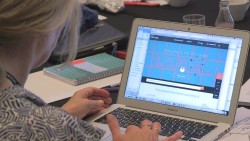Toolkit on RRI to help transform research and innovation in Europe
In an effort to narrow the gap between science and society, the European Commission pushed forward the Responsible Research and Innovation (RRI) concept, a cross-cutting issue within Horizon 2020. The Europe-wide approach seeks to bring R&I issues to the forefront, anticipate their consequences, and involve society in discussing how science and technology can help shape tomorrow’s world. Concrete tools are needed to implement RRI across Europe and realise this vision. Society in the front line of science and innovation To foster RRI, the EU-funded RRI TOOLS(opens in new window) (RRI TOOLS, a project to foster responsible research and innovation for society, with society) project engaged policymakers, research and academic communities, business, industry and civil society organisations. ‘This was achieved through inclusive, participatory collaboration in all stages of the project, from agenda setting to design, implementation and evaluation,’ says Ignasi López Verdeguer, director of the science department at “la Caixa” Banking Foundation and coordinator of RRI TOOLS. The Spanish non-profit organisation’s projects promote and fund social welfare, research and innovation as well as culture. RRI TOOLS achieved its aims by developing an ambitious training and advocacy programme, together with a strong emphasis on communication and dissemination activities. Project partners organised or participated in over 360 events, reaching about 9 200 people in 34 countries and 115 European cities. Nineteen RRI hubs were set up to cover 30 countries in the European Research Area in order to execute the project at national and regional levels. In 2014, the hubs organised 27 consultation workshops that attracted more than 400 relevant stakeholders. In 2016, they facilitated over 100 RRI training sessions that gathered about 3 000 trainees across Europe. In addition, the hubs held over 100 advocacy meetings. Online repository for all things RRI A toolkit was created to put RRI into practice. It contains over 500 resources, including manuals, guidelines, how-tos, inspirational practices, projects, articles and reports in 18 European languages. They cover open access, gender equality, ethics and integrity, and public engagement in science. ‘The online platform is participatory, and can be used by people with varying levels of expertise and needs,’ explains Ignasi López. ‘It assists users in learning, implementing, reflecting, training and communicating RRI.’ Visitors can create an account, join the RRI community, upload their own resources and participate in forum discussions. The hubs’ intensive efforts led to the establishment of a European community of practice (CoP) that brings together nearly 2 000 key RRI actors with the aim of utilising and continuously contributing to the toolkit. ‘This will ensure that the toolkit continues to evolve and acts as a source for the latest information on RRI in the future,’ states Ignasi López. The project also developed a working definition of RRI, created a catalogue of RRI best practices, and produced a collection of showcases that exemplifies how RRI can be applied by businesses, governments, funding bodies, research centres, civil society and educational institutions. The impact and visibility of RRI TOOLS inspired the European Foundations Award for Responsible Research and Innovation. Launched in 2015, this sister initiative recognises the three best RRI projects in Europe. Even though the project ended in December 2016, “la Caixa” Banking Foundation is committed to maintaining the toolkit and keeping the CoP active through to 2018. It has developed a sustainability plan to ensure this is feasible. ‘RRI TOOLS has laid the groundwork for more responsible, acceptable and ethical science and technology development in Europe in pursuit of a better, more sustainable and more equitable world,’ concludes Ignasi López.



